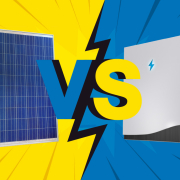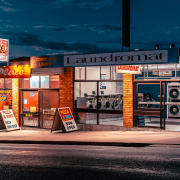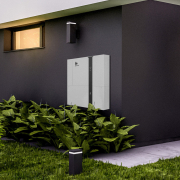If you’ve typed “Are Solar Batteries Safe” into your Google search bar, it means you’re either considering solar storage for your home or just geeking out on some seriously cool tech. Either way, you’ve landed in the right place.
It’s a smart question, especially if you’ve seen the occasional headline about battery fires or explosions. While those stories tend to grab attention, they’re incredibly rare (and often taken out of context). Still, when it comes to something that’s installed in or near your home, it makes sense to dig a little deeper.
Let’s clear the air: modern solar batteries are extremely safe. They’re designed to meet strict Australian standards, built with smart technology, and equipped with systems that monitor performance and cut power if something’s not quite right.
But like most things, not all batteries are made equal. One of the biggest factors that influences safety and one many homeowners haven’t even heard of: battery chemistry.
Whether you’re comparing quotes or simply ensuring you choose the safest option for your home and family, we’re here to help. Let’s break it down together.
A big part of it comes down to what’s inside the battery. Specifically, the materials and chemical makeup used to store and deliver energy.
So… Are Solar Batteries Safe?
Obviously.
We wouldn’t have built an entire business around them if we didn’t believe in their safety and use them in our own homes.
All solar batteries sold and installed through accredited providers in Australia are required to meet strict national safety standards. When installed by a Clean Energy Council (CEC) accredited professional and paired with a reliable Battery Management System (BMS), the risk of anything going wrong is extremely low.
But safety isn’t just about ticking the right boxes on paper. A big part of it comes down to what’s inside the battery. Specifically, the materials and chemical makeup used to store and deliver energy.
Let’s break it down in terms everyone can understand.

Understanding the Different Battery Types
If you’re new to the world of solar storage, we understand you’re probably a mix of confusion and overwhelm right now. And you’re probably sick of googling unfamiliar terms and tech jargon.
So, here’s a quick guide to the main battery types currently used in Australia… In terms you’ll understand:
Lithium-ion (Li-ion)
This is the most common battery type on the market today. You’ll find it in phones, laptops, electric cars — and yes, in many solar battery systems. Within the lithium-ion family, there are several different chemistries, some of which are more sensitive to heat and overcharging than others. One example is NMC (nickel manganese cobalt), which is compact and efficient, but not the most stable at high temperatures.
Lithium Iron Phosphate (LiFePO₄)
This is a specific type of lithium-ion battery, but with one key difference: it’s far more stable. It’s also highly durable, non-toxic, and performs incredibly well in hot conditions — which makes it particularly well-suited to Aussie homes. We’ll go into more detail on this below.
Lead Acid
You might recognise this one from car batteries. It’s old-school tech — bulky, heavy, and full of toxic materials. Some off-grid properties still use lead acid for backup storage, but they require ongoing maintenance and don’t hold a candle to modern lithium batteries when it comes to performance or safety.
Flow Batteries
These are still fairly new in the residential space. While they show promise in large-scale or commercial settings, they’re currently too expensive and impractical for the average homeowner.
LiFePO₄ batteries don’t contain cobalt, which is often associated with ethical and environmental concerns. So not only are they safer for your home, they’re better for the planet.
Why Lithium Iron Phosphate Is a Safer Choice
There’s a reason LiFePO₄ is becoming the battery chemistry of choice for solar manufacturers — and for homeowners who want reliability without the risk.
One of the biggest advantages of lithium iron phosphate is its thermal stability. That means it stays cooler under pressure. Unlike other lithium chemistries, LiFePO₄ is much less likely to experience “thermal runaway” — the chain reaction that can lead to overheating and, in extreme cases, fire. That’s especially important in Australian climates, where temperatures can soar well above 40°C in summer.
These batteries also last longer. We’re talking upwards of 6,000 cycles — or 10 to 15 years of everyday use — with minimal drop in performance.
And they’re cleaner too. LiFePO₄ batteries don’t contain cobalt, which is often associated with ethical and environmental concerns. So not only are they safer for your home, they’re better for the planet.

What to Look For in a Safe Solar Battery
Safety starts with good chemistry, but it doesn’t end there. Here’s what we recommend looking for when comparing battery options:
- Choose a battery that includes a smart Battery Management System (BMS)
- Make sure it complies with Australian safety standards
- Work with a Clean Energy Council accredited installer
- Look for systems that offer temperature monitoring and fault protection
- Ask about the expected lifespan, maintenance plans, warranty terms, and service support
At Solar Battery Group, we only work with battery partners who meet or exceed all safety requirements.
We’ll help you find a battery that works for your energy needs. And one that you can feel confident having in your home for the next few decades.
Why Peace of Mind Starts with the Right System
PSA: Choosing a solar battery shouldn’t be stressful.
The right system won’t just save you money — it’ll give you peace of mind, knowing you’ve invested in something that’s stable, dependable, and built to last. That’s why we’re big believers in lithium iron phosphate. It’s one of the safest, smartest choices for Australian homes.
So if you’re ready to take the next step, or you just want a bit of guidance from someone who’s not trying to sell you the most expensive system on the market, we’re here to help. And, we will even handle the majority of the boring paperwork for you.
Ready to explore your options?
Request a call back with Solar Battery Group and let’s chat through the safest and most reliable battery solutions for your home.
Or skip the chat and request a free quote — it only takes a few minutes online.

 Solar Battery Group
Solar Battery Group
 Solar Battery Group
Solar Battery Group Solar Battery Group
Solar Battery Group Solar Battery Group
Solar Battery Group Solar Battery Group
Solar Battery Group Solar Battery Group
Solar Battery Group
 Solar Battery Group
Solar Battery Group Solar Battery group
Solar Battery group


 Solar Battery Group
Solar Battery Group